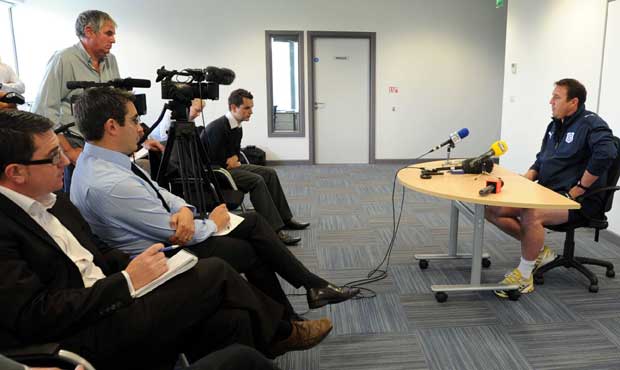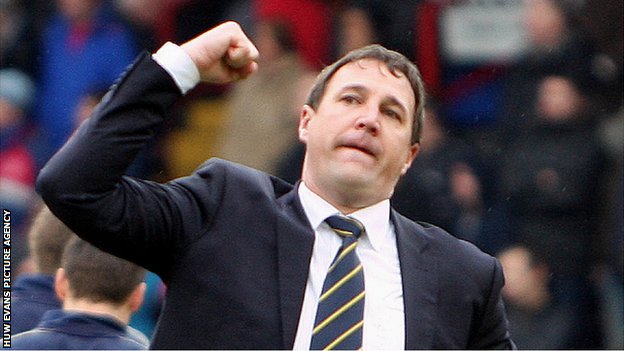Many of the faces which had become so familiar in the previous six years left the club last summer and when the league campaign started in August, it had something of a feel of a voyage into uncharted territory to it.
Players such as Bothroyd, Chopra, Matthews, Koumas and Burke may have had their faults, but they also showed in their time at the club that they could be match winners and with Craig Bellamy also there to provide the sort of class which made him one of Liverpool’s most effective players in their disappointing 2011/12 season, City had the individual ability to have done a lot better than the tame surrender we saw during Dave Jones’ final days at the club.
Increasingly, it seemed that the Dave Jones recipe for promotion consisted of getting as many “big name” attacking talents into his side as possible, but the balance between artists and artisans never looked quite right in his latter years at the club and I believe there was a general acceptance amongst the fanbase that the time for a change of direction had come – that’s exactly what we got.
Right from the start, there was a different feel to things under Malky Mackay. His first press conference on the day he was appointed featured a genuinely funny line about his friend Brendan Rodgers as City’s new manager showed that surly monologues on perceived injustices on the part of the local media were a thing of the past. To be honest, Malky Mackay only needed to be very ordinary in his dealings with the press to have have beaten the Dave Jones of his last couple of years at the club hands down in that department, but there’s been an honesty and enthusiasm to much of what our new manager has said to the press over the past eleven months which makes for such a refreshing change from what had been happening previously.
I’m not 100% sure if the term “park your ego’s at the door” got an airing at that first press conference or not, but it was heard and read plenty of times after that and was just what many wanted to hear after three years of failing at the final hurdle by Dave Jones’ gifted, but flawed sides – in just six words it captured the fundamental differences between the new and old approach.
There was also a very telling moment in that introduction to the media which tended to pass almost unnoticed when the new manager was asked about his philosophy with regard to how he wanted his teams to play. Having seen Malky Mackay’s Watford turn in some excellent televised victories by playing pacy, high tempo, attacking football and looked at the way they trounced us in December 2010 , I was pretty certain as to what the answer would be, but when it came, I was genuinely surprised as our new manager revealed that he and his staff looked at whoever our next opponents were and sent out the team to play in the way that would cause the opposition most problems.

How he handles the media is becoming an increasingly important part of any manager's job - Malky Mackay has proved himself very adept in this department so far.*
That answer showed a pragmatic side to our manager which,albeit from a distance, I had not been aware of previously and I must admit to a feeling of slight disappointment upon hearing it. However, when you think about it, the answer tied in with the new ethos at Cardiff City Stadium. We had come through a time when the attitude often seemed to be “who cares about the opposition – if we play like we can do, they’ve not got a chance”, now we were into a stage where the team was everything and we were going to be hard to beat.
In so many ways, the new approach worked – only West Ham lost fewer matches than us in the Championship and to beaten just four times out of twenty three on your travels was a superb achievement which you would normally associate with a top two team. As to why this great record wasn’t the foundation for the sort of finish which looked to be a possibility for two thirds of the season, well I’d say that, if Dave Jones’ teams were sometimes too guilty of playing cavalier football, then there was a bit too much of the roundhead about the stuff we played under Malky Mackay.
It was noticeable when looking at the messageboards of clubs we were signing players from last summer how many times the same sort of comment came up – for example, Don Cowie would be a Premiership player if he had more pace, Andrew Taylor sometimes struggles for pace, “slow” Joe Mason (a very harsh nickname in my opinion), and Craig Conway doesn’t have the speed to get clear of full backs. With Kenny Miller and Robert Earnshaw both looking to have lost a bit of their pace as well and a nucleus of players already here who were hardly sprinters (e.g. Hudson, Whittingham, Gerrard and McPhail) , it wasn’t hard to spot one potential weakness in Malky Mackay’s new squad. Ben Turner was quicker than you’d expect him to be, as was Rudy Gestede, but the only player in what became our regular starting eleven who I’d say was really quick was Kevin McNaughton.
Indeed, the fact that super Kev spent most of the season hurtling up and down the right wing, in home matches especially, in a, largely, fruitless attempt to supply some attacking width and creativity to a team conspicuously lacking in both of these things, only served to emphasise that, apart from Conway and Taylor’s excellent crossing when given a bit of time and space, we had very little with which to hurt opponents from wide areas in open play. It was only natural that the lack of pace in the side would result in plenty of checking inside instead of trusting your speed to get you around the outside of your opponent and, with players such as Cowie and Gunnarsson naturally gravitating towards the centre of the pitch when they were, ostensibly, playing on the “wing”, the centre of the park had a tendency to become very congested indeed.

The Malky Mackay victory fist pump was not seen often enough at Cardiff City Stadium from January onwards.
For a lot of the season, Peter Whititngham’s form was so good that he was still able to find enough room and time for himself in what has become his normal central midfield position, to give the team a creative edge. However, with the player regarded by many as the best in the division adapting to his new manager’s credo of wanting to see the sweat on his player’s shirts at the end of each match, as much as any of his team mates, Whittingham, like many others, tired as the season went on and was nowhere near as influential in the final third of the campaign as he had been up to February. It’s also probably true to say that as sides prepared for their second match of the season against the new City, the word went out “stop Whittingham and you stop Cardiff”. Although the availability of Steve McPhail and the addition of Liam Lawrence (another whose natural instinct was to head for the crowded middle areas of the pitch) took some of the creative burden off Whittingham’s shoulders, it’s still true to say that we were a pretty easy side to play against in the closing stages of the season if you were not too ambitious in terms of going for a win and you were able to defend dead ball situations properly.
The weaknesses in opponents Malky Mackay hoped to exploit were no longer as apparent when the onus was on City to break down sides at Cardiff City Stadium and teams like Blackpool, West Ham, Hull, Coventry, Watford and Leeds all knew that our poor home goals against record meant that they would get chances to score somewhere along the line. The energy and drive that had been such a feature earlier in the campaign had now, largely, gone as City’s season hit the buffers in much the same way as Watford’s had done in the previous two years. If you are playing the blame game, then Malky Mackay has to take his fair share of it for the way in which we went from one point behind second place at the end of January to scraping into the Play Off’s come late April. It’s not as if our manager didn’t know what areas of his team needed reinforcing – the bids for Noone, Phillips and Sordell in January showed that, but, whatever the truth is about that strange January transfer window, to go from August to March without bringing in players that would, hopefully, cure season long weaknesses has to be something which should be held against any manager.
The thing is though that I’m guilty here of doing what many others are and that is concentrating on what went wrong in our season because most of the bad parts of our campaign are freshest in our minds. If there is a sense of disappointment with the way things worked out then it stems from the fact that Malky Mackay did such a good job in raising expectations from August to February – he was given a thankless task last June and managed to put together a squad which never once looked like it would struggle . Perhaps some of his signings were too similar as players and a bit more variety would have been welcome, but we’ve now got a younger and hungrier squad filled with players who would fetch a tidy sum in the transfer market- many of them should get better in the next few years as well.
For most of the season this City side were unlike so many I’ve seen in that they actually raised their level of performance for the big games – the West Ham Play Off matches were one bridge too far for them in my opinion. This was seen in the latter stages of our Carling Cup run and in a record which saw us take ten points from the four matches against the two sides who were promoted automatically – where we fell down in my book was in our inability to turn draws into wins against teams in the lower half of the table (eleven against the teams from twelfth downwards).
It’s very easy to fall off the tightrope which represents the correct balance between creativity/individual approach and hard work/team ethic in football. Dave Jones consistently toppled off it because he went too much towards the former approach while, on the other hand, Malky Mackay lost his balance because of an over reliance on the latter. However, what our new manager’s approach has done is put foundations in place where previously there were none and, as long as he is given the sort of playing budget that last week’s bid for Jaime Vardy suggests he’s got, I back Malky Mackay to get the balance right next year after a very promising first season at Cardiff which I’d say merits a marking of seven out of ten.
picture courtesy of http://www.walesonline.co.uk/